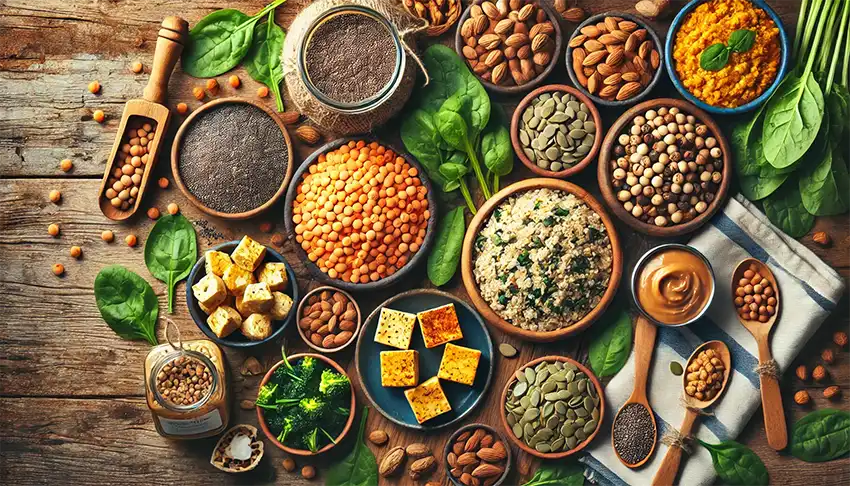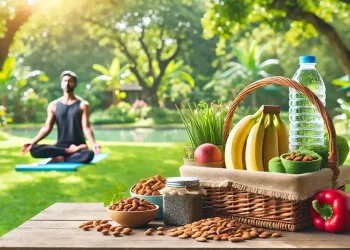Protein is a critical nutrient that supports muscle growth, recovery, and healthy weight management. For vegetarians, finding reliable sources of protein is essential for maintaining optimal health and achieving fitness goals. In this guide, we’ll explore the best high protein foods—all vegetarian—that can help you achieve your fitness goals naturally.
Protein is the secret weapon for both muscle gain and weight loss, and you don’t need meat to get it. We’ll break down what protein is, why it’s essential, and whether whole foods are better than protein powders. From Indian staples like lentils to global favorites like quinoa, these foods are not only tasty and affordable but also packed with goodness.
Ready to fuel your body the organic way? Let’s dive in and discover the best vegetarian protein-rich foods that effectively support muscle gain and weight loss!
What is Protein?
Protein is one of the three macronutrients—alongside carbohydrates and fats—that your body needs to function optimally. Composed of amino acids, which serve as the building blocks for various bodily functions, protein plays a crucial role in repairing tissues, building muscles, and producing enzymes and hormones. Since the human body can’t produce all essential amino acids, obtaining sufficient protein from your diet is necessary.
The good news is that vegetarian diets can supply all these essential amino acids with the right choices, proving that you don’t need meat to thrive! With thoughtful planning, you can meet your protein needs and support your overall health.
Why Protein Is Important?
Protein is a big deal for your health and fitness. Here’s why:
- Muscle Growth: Repairs and builds muscle after workouts.
- Weight Loss: Keeps you full longer, reducing cravings.
- Energy Boost: Supports metabolism and daily stamina.
- Bone Health: Strengthens bones alongside calcium.
- Immunity: Helps create antibodies to fight illness.
For vegetarians aiming for muscle gain or weight loss, protein is non-negotiable. It’s the fuel that powers your goals—naturally and sustainably.
Top 15 Vegetarian Protein Foods
1. Lentils (Masoor, Moong, Chana)
Lentils are a protein powerhouse, providing approximately 18 grams of protein per cooked cup. They are rich in fiber and iron, promoting digestion and energy.
- Why It’s Great: Affordable, fiber-rich, and versatile.
- How to Use: Cook dal with spices or make lentil patties.
2. Chickpeas (Chole)
Offering about 15 grams of protein per cooked cup, chickpeas also contain fiber and nutrients essential for heart health and weight control
- Why It’s Great: Packed with protein and iron.
- How to Use: Roast for a snack or simmer in a curry.
3. Tofu
Derived from soybeans, tofu contains about 10 grams of protein per 100 grams, alongside essential amino acids crucial for muscle repair.
- Why It’s Great: Soy-based, absorbs flavors well.
- How to Use: Grill or stir-fry with veggies.
4. Tempeh
This fermented soybean product contains about 20 grams of protein per 100 grams, also offering probiotics for improved gut health.
- Why It’s Great: Fermented soy, rich in probiotics.
- How to Use: Sauté with spices for a protein punch.
5. Greek Yogurt
Greek yogurt delivers around 15-20 grams of protein per serving, excellent for muscle recovery and probiotic support for gut health.
- Why It’s Great: Thick, probiotic-rich, and filling.
- How to Use: Use as a dip or breakfast base.
6. Quinoa
A complete protein, quinoa offers 8 grams per cooked cup, making it an excellent grain option for vegetarians looking for muscle growth.
- Why It’s Great: Complete protein with all 9 amino acids.
- How to Use: Swap rice for quinoa in pulao.
7. Edamame
Edamame provides around 17 grams of protein per cooked cup, loaded with fiber and antioxidants beneficial for overall health.
- Why It’s Great: Young soybeans, fun to eat.
- How to Use: Steam and sprinkle with salt.
8. Cottage Cheese
High in casein protein, cottage cheese contains around 14 grams per half-cup, supporting prolonged muscle repair and growth.
- Why It’s Great: Creamy, high in calcium too.
- How to Use: Make paneer tikka or add to curries.
9. Pumpkin Seeds
Pumpkin seeds offer about 8 grams of protein per ounce, packed with magnesium and zinc, crucial for muscle recovery and immune health.
- Why It’s Great: Crunchy, magnesium-rich.
- How to Use: Roast for a snack or garnish.
10. Almonds
With about 6 grams of protein per ounce, almonds also provide healthy fats and fiber, promoting heart health and satiety.
- Why It’s Great: Healthy fats and protein combo.
- How to Use: Eat raw or blend into butter.
11. Chia Seeds
Offering around 5 grams of protein per ounce, chia seeds also contain fiber and omega-3 fatty acids, great for reducing inflammation.
- Why It’s Great: Tiny but mighty, plus omega-3s.
- How to Use: Soak in milk for pudding.
12. Peanut Butter
Two tablespoons of peanut butter supply around 8 grams of protein, ideal for quick snacks that support muscle gain and weight control.
- Why It’s Great: Peanut butter is a creamy, protein-packed powerhouse that’s perfect for vegetarians
- How to Use: Pair with apple slices or celery for a filling, low-carb bite
13. Oats
Oats provide approximately 6 grams of protein per cooked cup, rich in fiber, beneficial for heart health and sustained energy.
- Why It’s Great: Oats are a versatile, fiber-rich grain that pack a surprising protein punch
- How to Use: Blend into flour for protein-packed pancakes or muffins.
14. Spinach
Surprisingly, spinach offers about 3 grams of protein per cup when cooked, along with essential vitamins and minerals supporting overall health.
- Why It’s Great: This leafy green is low in calories and carbs
- How to Use: Toss raw leaves with chickpeas and a lemon dressing.
15. Black Beans
Black beans deliver approximately 15 grams of protein per cooked cup, beneficial for muscle maintenance and digestive health.
- Why It’s Great: rich in fiber, which aids digestion and keeps you full—great for weight loss
- How to Use: Toss with spinach and pumpkin seeds for a filling lunch.
These high protein foods are your go-to for building muscle and shedding weight—naturally vegetarian and delicious!
How to Incorporate These Foods Into Your Diet
- Breakfast: Greek yogurt topped with chia seeds, almonds, and fresh fruit.
- Lunch: Quinoa salad mixed with black beans, spinach, and chickpeas.
- Snack: Apple slices with peanut butter or roasted pumpkin seeds.
- Dinner: Stir-fry tofu or tempeh with edamame and lentils, served alongside a fresh spinach salad.
Risks and Considerations
These foods are awesome, but watch out:
- Overeating Nuts/Seeds: High calories can add up—stick to a handful.
- Digestive Issues: Too many legumes may cause bloating—start slow.
- Allergies: Check for soy (tofu) or nut sensitivities.
Moderation keeps the benefits flowing without hiccups.
Protein Foods vs. Powder : What’s Better?
Wondering if you should stick to food or grab a protein powder? Let’s compare:
Protein Foods
- Pros: Whole nutrients (fiber, vitamins), affordable, tasty.
- Cons: Takes time to prep, protein varies per serving.
- Best For: Everyday meals, long-term health.
Protein Powders
- Pros: Quick, concentrated protein (20–30g per scoop).
- Cons: May lack micronutrients, can get pricey.
- Best For: Post-workout boosts or busy days.
For vegetarians, foods like lentils, tofu, and paneer are fantastic staples. Powders (e.g., pea or soy protein) can supplement, but whole foods win for sustainability and variety. Mix both if your goals demand it—consult a pro to decide!
FAQs About High Protein Foods
1. What’s the best vegetarian protein for muscle gain?
Tempeh and paneer top the list with 19g and 18g protein per 100g—perfect for muscle repair.
2. Can I lose weight with these high protein foods?
Yes! Protein fills you up, like Greek yogurt or lentils, helping curb overeating.
3. How much protein do I need daily?
Aim for 0.8–1.2g per kg of body weight; more (1.6–2g) for muscle gain—adjust with activity.
4. Are protein powders better than food?
Not always—foods offer more nutrients, but powders are handy for quick boosts.
5. Can kids eat these high protein foods?
Absolutely! Smaller portions of paneer or quinoa support growth—just keep it balanced.
6. Do I need all 15 foods daily?
No—rotate a few to hit your protein goals and keep meals fun.
7. Can these foods replace meat completely?
Yes! Combine them (e.g., lentils + quinoa) for all essential amino acids.
Conclusion: Build Muscle and Slim Down with Vegetarian Protein
You don’t need meat to power up your fitness journey! These 15 high protein foods—from lentils to nutritional yeast—offer everything you need for muscle gain and weight loss. They’re vegetarian, packed with nutrients, and perfect for an organic lifestyle. Whether you’re cooking a hearty rajma or snacking on roasted almonds, you’re fueling your body the natural way. Start adding these to your plate today and watch your strength soar while the kilos drop!
Disclaimer
This article provides general information, and the images are for reference only. It is not a substitute for professional medical advice, diagnosis, or treatment. Always consult a specialist or your doctor for more information. Well Health Organic does not guarantee the accuracy, completeness, or reliability of the information provided. We do not endorse any products mentioned in the article or through external links.



















